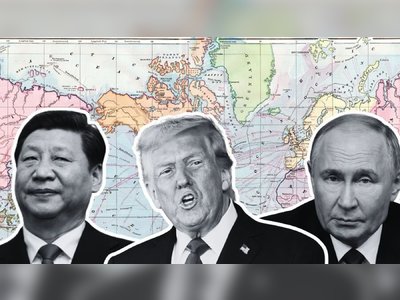Global Economic Forecast Adjusted Amid Geopolitical Tensions
International organizations revise economic predictions as supply chain disruptions and inflation persist across multiple regions.
Major international economic institutions have revised their growth forecasts for 2023 and 2024, reflecting ongoing geopolitical tensions and persistent inflationary pressures.
The International Monetary Fund (IMF) has reported a projected global growth rate of 3.0% for 2023, down from earlier predictions of 3.5%.
This adjustment comes in light of challenges such as the conflict in Ukraine, rising energy prices, and tightening monetary policies in various countries.
In Europe, the energy crisis triggered by the war in Ukraine continues to exert pressure on economies, particularly in the Eurozone, where inflation rates have surged to levels not seen in decades.
As of September 2023, the European Central Bank (ECB) indicated that inflation remained above the target rate of 2%, prompting a series of interest rate hikes that have compounded economic challenges, particularly for households and businesses.
Meanwhile, in the United States, the Federal Reserve has implemented aggressive rate increases to combat inflation, which has seen its Consumer Price Index rise significantly over the past year.
The latest reports indicated an annual inflation rate of approximately 5.4%, prompting concerns about the potential for a recession as higher borrowing costs affect consumer spending and business investment.
Asia has also felt the impact of these global economic shifts.
China’s economy is grappling with a slow recovery post-COVID-19, compounded by a real estate crisis that is affecting both domestic and international confidence.
Growth forecasts for China have been adjusted to around 4.5% for 2023, down from earlier estimates of 5.5%.
This slowdown is likely to affect global supply chains, particularly in industries reliant on Chinese manufacturing.
In addition, the ongoing trade tensions between the United States and China continue to pose challenges to international trade.
Tariffs and trade restrictions have influenced market dynamics, particularly in the semiconductor sector, where global supply shortages persist.
Sustainable development efforts have faced setbacks as well, with rising energy prices forcing some countries to re-evaluate their green transition timelines.
Renewable energy investments are under review in various nations as fiscal pressures mount, potentially slowing progress towards global climate targets.
Additionally, the recent extreme weather events, including floods and heatwaves linked to climate change, have disrupted agricultural productivity in several regions, leading to food security concerns and further inflationary pressures on essential goods.
The current geopolitical climate is expected to remain fluid, with various governments exploring measures to shore up economic resilience amid these prevailing uncertainties.
The International Monetary Fund (IMF) has reported a projected global growth rate of 3.0% for 2023, down from earlier predictions of 3.5%.
This adjustment comes in light of challenges such as the conflict in Ukraine, rising energy prices, and tightening monetary policies in various countries.
In Europe, the energy crisis triggered by the war in Ukraine continues to exert pressure on economies, particularly in the Eurozone, where inflation rates have surged to levels not seen in decades.
As of September 2023, the European Central Bank (ECB) indicated that inflation remained above the target rate of 2%, prompting a series of interest rate hikes that have compounded economic challenges, particularly for households and businesses.
Meanwhile, in the United States, the Federal Reserve has implemented aggressive rate increases to combat inflation, which has seen its Consumer Price Index rise significantly over the past year.
The latest reports indicated an annual inflation rate of approximately 5.4%, prompting concerns about the potential for a recession as higher borrowing costs affect consumer spending and business investment.
Asia has also felt the impact of these global economic shifts.
China’s economy is grappling with a slow recovery post-COVID-19, compounded by a real estate crisis that is affecting both domestic and international confidence.
Growth forecasts for China have been adjusted to around 4.5% for 2023, down from earlier estimates of 5.5%.
This slowdown is likely to affect global supply chains, particularly in industries reliant on Chinese manufacturing.
In addition, the ongoing trade tensions between the United States and China continue to pose challenges to international trade.
Tariffs and trade restrictions have influenced market dynamics, particularly in the semiconductor sector, where global supply shortages persist.
Sustainable development efforts have faced setbacks as well, with rising energy prices forcing some countries to re-evaluate their green transition timelines.
Renewable energy investments are under review in various nations as fiscal pressures mount, potentially slowing progress towards global climate targets.
Additionally, the recent extreme weather events, including floods and heatwaves linked to climate change, have disrupted agricultural productivity in several regions, leading to food security concerns and further inflationary pressures on essential goods.
The current geopolitical climate is expected to remain fluid, with various governments exploring measures to shore up economic resilience amid these prevailing uncertainties.
AI Disclaimer: An advanced artificial intelligence (AI) system generated the content of this page on its own. This innovative technology conducts extensive research from a variety of reliable sources, performs rigorous fact-checking and verification, cleans up and balances biased or manipulated content, and presents a minimal factual summary that is just enough yet essential for you to function as an informed and educated citizen. Please keep in mind, however, that this system is an evolving technology, and as a result, the article may contain accidental inaccuracies or errors. We urge you to help us improve our site by reporting any inaccuracies you find using the "Contact Us" link at the bottom of this page. Your helpful feedback helps us improve our system and deliver more precise content. When you find an article of interest here, please look for the full and extensive coverage of this topic in traditional news sources, as they are written by professional journalists that we try to support, not replace. We appreciate your understanding and assistance.











